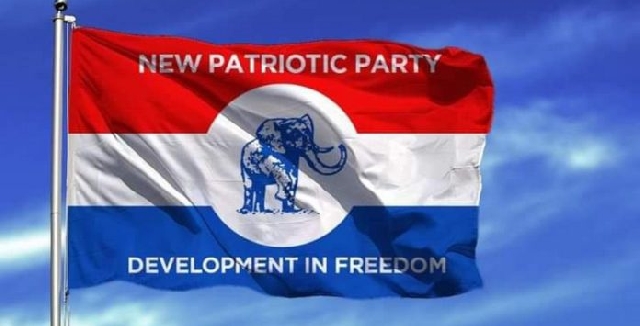The NPP’s historic defeat: A case of poor leadership and failed communication
 NPP flag
NPP flag
The New Patriotic Party’s (NPP) resounding defeat in the 2024 general elections has sparked intense discussion on the causes behind their collapse.
While multiple factors contributed to their downfall, poor leadership and failed communication stand out as the most critical.
This failure was not limited to verbal communication but extended to non-verbal cues, participatory communication, community engagement, and the overall approach to stakeholder involvement.
Party Primaries: Ignoring Grassroots Sentiment
Effective communication is a cornerstone of development at all levels — local, national, and international.
It is also essential within institutions such as schools, families, and churches.
Leaders who neglect communication as a tool for development do so at their peril.
The NPP's leadership, from the primaries to the general elections, displayed a clear disregard for these principles.
From the onset, signs of internal dissatisfaction were evident.
The NPP's presidential primaries revealed a deep disconnect between party executives and the grassroots. While Vice President Dr. Mahamudu Bawumia was presented as the party’s preferred candidate, Kennedy Agyapong’s strong performance during the primaries exposed the growing discontent within the party.
His rise was symbolic of a larger frustration with the party's top-down approach to decision-making.
Instead of engaging the party base and addressing their concerns, party leadership opted for imposition and control.
This neglect of participatory communication, and community engagement backfired, creating internal rifts that eventually spilled into the general elections.
Policy Missteps: Arrogance and Disregard for Public Sentiment
Beyond internal party issues, the NPP’s policy decisions played a central role in their electoral defeat.
The implementation of the E-Levy remains one of the most criticized decisions in Ghana’s recent political history.
From the outset, Ghanaians rejected the E-Levy, citing its negative impact on ordinary citizens already struggling to afford daily meals.
Yet, the government maintained an arrogant posture, ignoring widespread protests and appeals from civil society and stakeholders.
This was not an isolated case. Other unpopular tax measures, such as the COVID-19 levy, compounded the economic burden on citizens.
Despite clear signals from stakeholders, including business owners, labour unions, and ordinary Ghanaians, the government pressed on with these policies.
Their refusal to listen or reconsider decisions exposed the leadership’s lack of empathy and failure to engage key stakeholders.
Policies that had the potential for long-term benefits, like Free Senior High School (SHS), were equally mismanaged.
While Free SHS was a noble initiative, its implementation placed significant strain on the national budget. Critics called for a review of the programme to address issues of funding, quality, and sustainability.
Parents and education stakeholders complained about the costs of books, feeding, and general welfare for students.
Instead of responding to these concerns, the government maintained a defensive posture, further alienating the people.
Economic Hardship and Public Discontent
The economic hardship experienced by Ghanaians became a pivotal issue in the 2024 elections.
Citizens were grappling with high inflation, rising cost of living, and reduced purchasing power.
Many Ghanaians believed that government policies, such as excessive taxation, were to blame for their predicament.
The leadership's failure to acknowledge the suffering of ordinary people, coupled with their refusal to review harmful policies, created a toxic relationship between the government and the governed.
While infrastructure projects like roads and schools were completed under the NPP, the economic hardship overshadowed these achievements.
Citizens appreciated the physical development but felt that their immediate survival needs were being ignored.
This failure to prioritize the people’s well-being was seen as a leadership flaw.
No leader can claim to be transformational without taking into account the interests and well-being of the people.
The Role of Communication in Leadership
At the heart of leadership lies communication.It is not enough for leaders to implement projects; they must carry the people along.
Participatory communication, stakeholder engagement, and community involvement are essential for any development agenda.
When leaders fail to engage the people, development efforts are often met with resistance.
This is because people naturally resist projects they do not understand or see as beneficial to them.
The NPP leadership failed to recognize that communication is the lifeline of development.
Effective communication helps leaders to build trust, calm tensions, and foster a sense of collective ownership.
On multiple occasions, Ghanaians raised their voices against unpopular policies, but instead of engaging in dialogue, the government adopted an arrogant "we know best" approach.
As a result, citizens felt alienated, angry, and ready for change.
If the NPP had prioritized open, honest, and participatory communication, the outcome of the 2024 elections might have been different.
The party's failure to listen, engage, and show empathy cost them dearly.
Lessons for Future Leadership
Leadership is about influence, empathy, and the ability to guide people toward a shared vision.
As Ghana prepares for new leadership under the National Democratic Congress (NDC), it is imperative that the lessons from the NPP’s defeat are heeded.
The new government must prioritize stakeholder consultation, participatory development, and effective communication.
Policies and development projects must be people-centered.
Citizens are no longer passive participants; they are active stakeholders.
Leaders must engage them at every stage — from policy formulation to implementation.
They must also adopt communication strategies that demonstrate empathy, transparency, and accountability. Failure to do so will result in the same fate that befell the NPP.
The NDC now has a golden opportunity to rebuild trust and deliver people-centered development.
The hope is that they will adopt a new approach to governance, one that puts the people first. Congratulations to the NDC for their historic victory!
Mr. Dennis Agyei Boateng
Development Communications Expert (Media Management/ Strategic Communications/ Social Action Projects)
Source: Mr. Dennis Agyei Boateng







